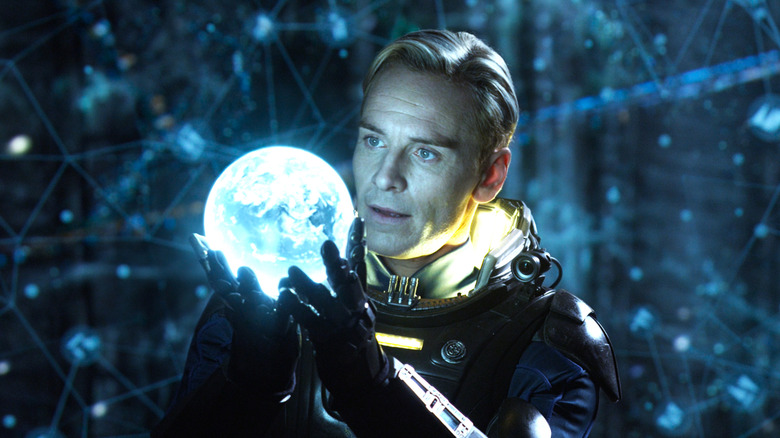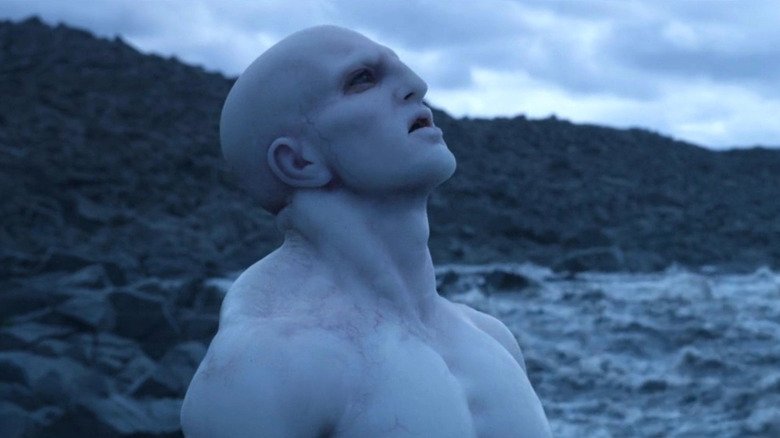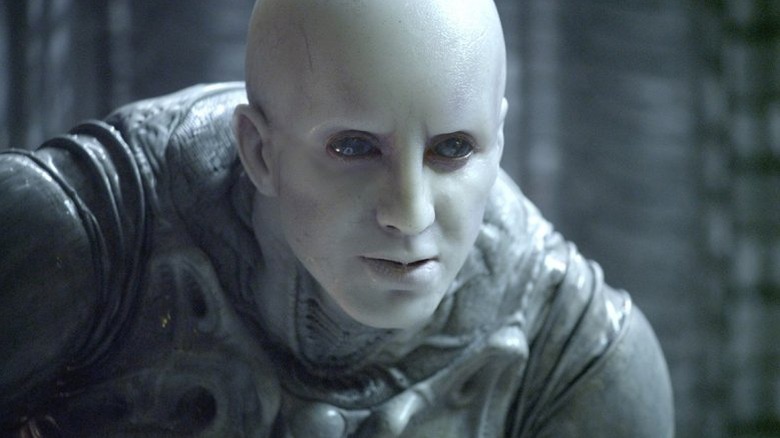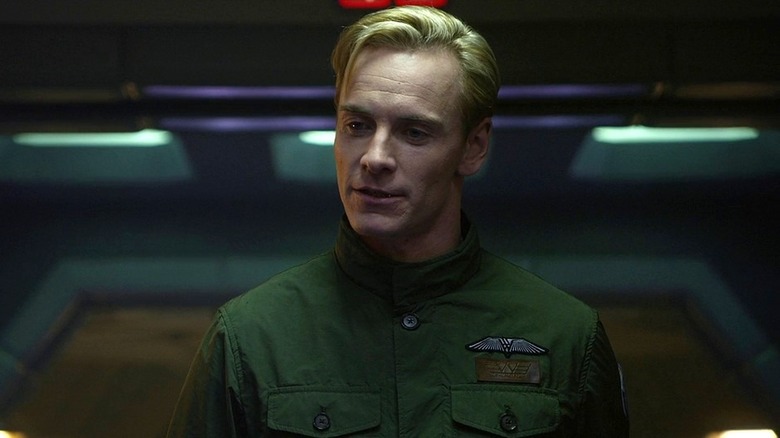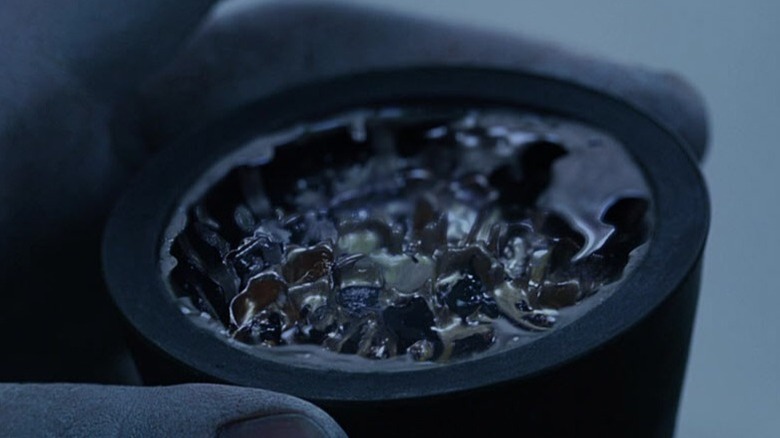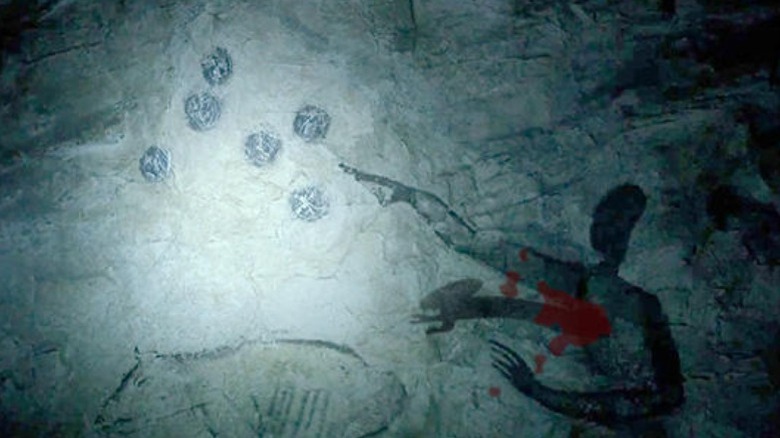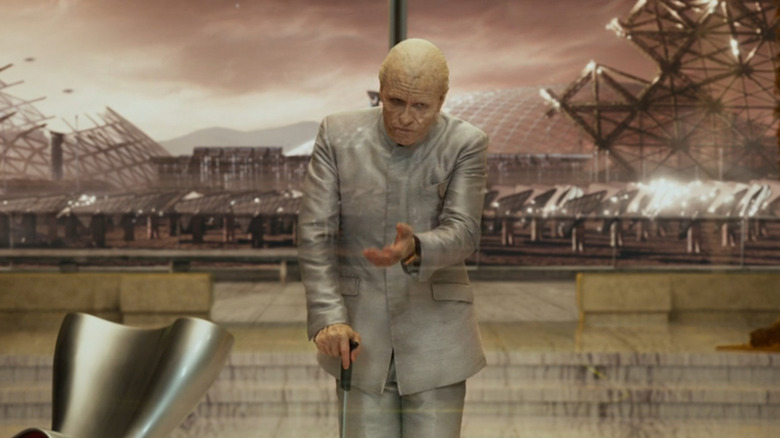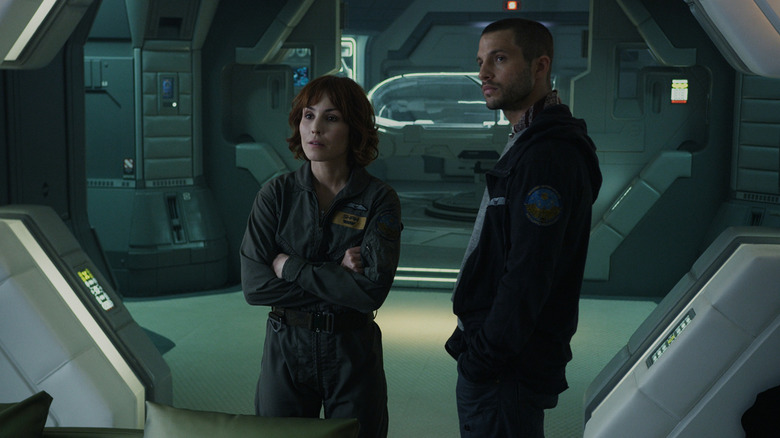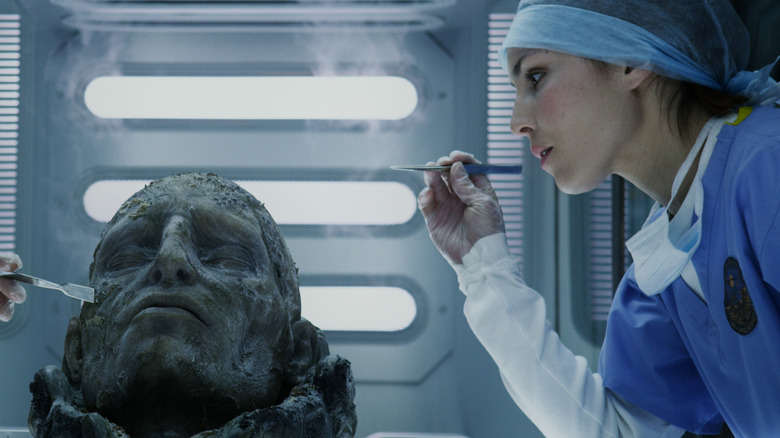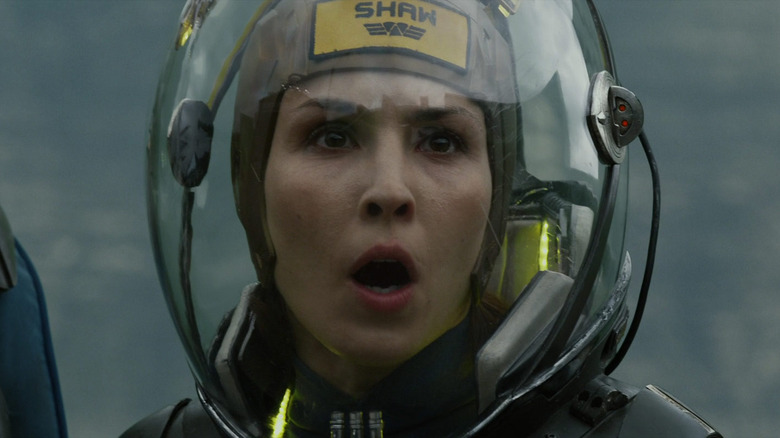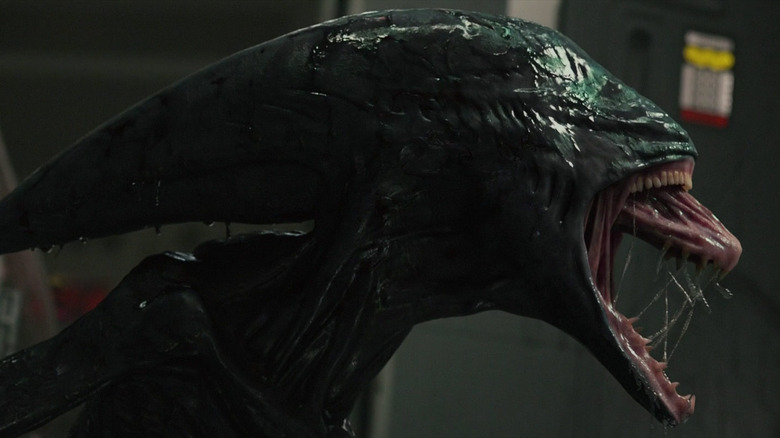Prometheus Explained: Breaking Down The Ending
We may receive a commission on purchases made from links.
Ridley Scott's space-horror classic "Alien" doesn't exactly cry out for a prequel. The plot is pretty simple: The crew of a spaceship encounters a vicious alien that proceeds to kill most of them. It pretty much explains itself. So no one was quite prepared for the science fiction epic "Prometheus." Set decades before "Alien," it takes a detour to the dawn of humanity before recorded history. It's essentially Scott's "2001: A Space Odyssey" – a visually stunning, epic space opera but replacing Stanley Kubrick's cold depiction of the vastness of space with squirm-inducing horror.
A beautiful film with some committed performances, "Prometheus" won favorable reviews and made a decent return at the box office even though it's kind of confusing the first time through. Expanding the scope of the "Alien" story well beyond the continued human vs. Xenomorph run-ins (and the non-canonical "Alien vs. Predator" movies), "Prometheus" contains big ideas about the origins of humanity, evolution, and faith that Scott had been mulling over for years before finally getting to make it. The result is as complex as a lecture and as opaque as a cave painting, but let's take a decoder ring to it as well as we can. This is the ending of "Prometheus" explained.
Explaining the beginning
"Prometheus" announces its epic intentions in the very first scene, with stunning cinematography of a lush deserted wilderness that we'll later learn is Earth. Wide, immaculate shots of the pre-historic landscape accompany Marc Streitenfeld's ethereal score, and we're introduced to our first member of the pale alien race affectionately known as "the Engineers." This mysterious being watches a spaceship depart in the clouds, and then drinks a mysterious black liquid from a metal cup. Immediately, he doubles over in pain and begins to disintegrate — the camera zooms in to show us his very DNA is dissolving, and then it begins recombining as he plunges into a waterfall.
Later it is suggested (based on how the DNA of an Engineer closely resembles human DNA), that this was the moment the Engineers essentially created humanity. In a similar way to the monolith from the all-time great opening scene of "2001: A Space Odyssey" gives primates a kick-start in the evolution of consciousness, "Prometheus" posits that this humanoid alien race sent a lone member on a fateful mission to break himself down into the genetic building blocks that would eventually become modern humanity. Why that process would take such a long detour into pre-hominids and australopithecines isn't entirely made clear, but the Engineers are shown to definitively be the creators of humanity.
For engineers, they seem to change plans a lot
If we are supposed to take the guesswork of lead archaeologist Elizabeth Shaw (Noomi Rapace) and captain of the Prometheus, Janek (Idris Elba), at face value, we're left with a confusing picture of the Engineers and what their motivations ultimately were.
Some billions of years ago, the Engineers sacrificed one of their own to create humanity, and then they visited Earth several times to check in on them, somehow communicating to several primitive civilizations and leaving behind a star map to their base, which Shaw and Charlie Holloway (Logan Marshall-Green) discover in ancient cave paintings. As such they initially appear to be benevolent creators, who gave birth to humanity and then left us an invitation to the stars.
However, when the crew of the Prometheus arrives at LV-223 (the inelegant name given to the habitable moon in the system the star maps seemed to indicate), all they find is a base that seems more like a military installation than the Engineers' homeworld and records that indicate they all died right before they returned to Earth to destroy humanity with several vials of a black goo-based "weapon of mass destruction." Why? If they found humanity to be unworthy, it would presumably have something to do with humanity's penchant for wanton destruction like mass war and genocide, so it seems a little hypocritical to decide to wipe us out. "Prometheus" can only hint at the answers to these questions, as the only living Engineer with a chance to speak in the movie goes on a murderous rampage instead. Typical.
David's hidden agenda
Compounding the already fog-like impenetrability of "Prometheus" are the ongoing strange actions of David, a synthetic android played by the capably robotic Michael Fassbender. He repeatedly drops vague and menacing hints that he's not terribly pro-humanity. He refers to them at large as "you people," and when Holloway remarks that he was made to be "close enough" to human, he responds, "Not too close, I hope." Soon, he embarks on secret missions to explore the Engineer's ship only to discover a living member of the alien species in cryo-stasis. This leads to him poisoning Holloway with a drop of the strange black goo (seemingly at random), which sets in motion a chain of events that results in Holloway's death and one of the most disturbing birth scenes in movie history with a terrified Shaw.
It transpires that David has been serving a hidden master the entire film: Peter Weyland (Guy Pearce), the trillionaire CEO of Weyland Corp who has feigned his own death. It's not explicitly stated, but dosing Holloway seems to have been a casually cruel experiment in testing the capabilities of the alien goo, on the off chance that they could aid Weyland in his quest for eternal life. David brings Weyland to the surviving Engineer in search of the same goal, only to be met with violent rage from a species with concerns far beyond the realm of Weyland's selfish goals.
The all-purpose black goo
The Engineers have achieved stunning feats of technology and space travel. They are shown to have created entire populations, piloted massive ships, and based on the navigational map in their ship, they have explored countless untold star systems. But their greatest achievement might be the Swiss Army-knife-esque mysterious black goo, which can accomplish basically whatever the plot of "Prometheus" needs it to at any given point.
To begin with, it has the ability to break down Engineer DNA to enable it to recombine and grow an entirely new species (humans), as we see at the opening of the film. Next, when Holloway has just a drop of it in his drink, it more or less instantly combines with his DNA and enables him to impregnate Shaw, who was previously infertile. The goo serves as the basic building blocks of humanity, and when combined with human DNA, it gives rise to Shaw's terrifying monster child. This in turn attaches itself like a huge face-hugger to an Engineer and results in a familiar, classic xenomorph-like chest-burster.
So the goo can evolve humanity over centuries, but it can also recombine into entirely new hybrid species overnight? If that's not impressive enough, it also turns Fifield (Sean Harris) into a terrifyingly strong, rage-filled zombie. It's a source of life and evolution, but it also seemingly the weapon the Engineers were planning to wipe out humanity with. Truly a remarkable, malleable substance, which returns in the franchise later on, playing pivotal part in the ending of "Alien: Romulus."
The cave drawings might have been a warning
So the Engineers created us and then decided to destroy us. Fair enough. But why leave the invitation to the stars for us in the cave paintings of so many primitive societies? Based on how much trouble a few humans manage to cause when they arrive on LV-223, it remains very unclear why the Engineers would leave a map to bring us there. If it's a military base, as speculated by Janek, it seems like it would be foolish to divulge its location, even if you don't consider humanity a threat. Based on the demeanor of the Engineer that the crew meets, it's clear that the Engineers regard humans as hardly more than houseflies or pests, and they have no interest in communicating. So why the map?
It's possible that our heroes vastly misinterpreted their discovery. Maybe the maps were in fact, a warning in the vein of a "Beware of Dog" sign — though "Beware of God" might be a little more fitting. Maybe their godlike indifference and malevolence were clear to ancient societies when the Engineers made sporadic visits to Earth to check on us, and they were trying to warn future humanity away from their point of origin, just in case space travel ever became an option. If that were the case, the least those primitive cultures could have done was add their version of the red circle with a line through it like the "Ghostbusters" logo.
The Prometheus myth
As briefly explained by Peter Weyland in hologram form, it's worth exploring how the Greek myth of Prometheus relates to the events of the movie and the fate of the ship that bears his name. Prometheus was one of the Titans, the gods that reigned before the much more well-known gods of Mount Olympus. His central myth is stealing fire from the gods and giving it to humanity, although in some myths he's also credited with creating humanity itself out of clay, which seems to have been Weyland's motivation for the name of the expedition he financed to meet the Engineers.
It's worth noting, however, that much like the movie, the story of Prometheus isn't just a creation myth but a story with eternal consequences for Prometheus and humanity. In punishment for giving humanity the light of fire (associated with wisdom and civilization), Prometheus is chained to a rock for all eternity, where an eagle eats out his liver every day. Humanity was punished with the creation of Pandora, who came along with her well-known "Pandora's Box" that contained all the evils in the world, essentially an earlier version of Eve, the snake, and the apple. "Prometheus" uses all of this as subtext, as man's desire to meet its creators and for knowledge and understanding in general, is punished severely with violence and death.
What happened 2,000 years ago?
One element of the mystery of the Engineers that's glossed over quickly in favor of the characters' harrowing struggle for survival is the question of what exactly happened to change the aliens' minds about humanity and decide to destroy us. We know that the body of the first decapitated Engineer the crew finds died "2,000 years ago, give or take," according to Shaw's carbon-dating device. So what might have happened on Earth circa 2,000 years ago that would make our creators decide that humans aren't worth saving?
If you thought of an answer related to why the calendar we use has coincidentally only passed 2,000 years itself, you're exactly right. In an interview with Movies.com, Ridley Scott confirmed that an earlier version of the "Prometheus" script made it explicit that Jesus Christ was an emissary from the Engineers, who were understandably upset when he received a less-than-kind welcome. This was removed from the final movie, so it's open to interpretation: Carbon dating isn't that precise, so maybe the Engineers took Julius Caesar's assassination in 44 B.C. really hard?
At what point does faith stop making sense?
One of the more frustrating and underdeveloped elements of "Prometheus" is the relationship between scientific discovery and religious faith. Like Charles Darwin's discoveries regarding human origins and evolution before them, Shaw and Holloway's discovery that humanity itself was created by alien beings has enormous implications for our self-conception as a species and the foundations of our faith. However, this is more or less met with a shrug by the team of contractors and scientists that are along with them on the mission. Shaw herself is the only character that maintains her faith, making it a point to hold on to a crucifix at different key moments.
Granted, she spends a lot of the movie just trying not to get killed by various alien monsters, but she also never has a chance to explain how her faith remains unshaken despite her research upending everything we've previously believed or imagined about the origins of humanity. There are vague allusions to Shaw's faith in her philosophical stance that if the Engineers created us, "who created them?" But there's not a real sense of how the Christian faith specifically (or any other religion for that matter) can accommodate the Engineers and their ability to create entire other races of beings into its theology and how that keeps her moving forward in the face of literal and existential horrors.
Chance and Ravel's bet was actually settled
One issue with "Prometheus" is that it arguably has more characters than it knows what to do with. Co-pilots Chance and Ravel (Emun Elliott and Benedict Wong) might not ring a bell, but you'll remember them as the two dudes that keep bringing up how Chance bet Ravel $100 that the mission they were on would turn out to be terraforming-related. When there's an atmosphere in the Engineer's temple, Chance tries to claim that he won the bet, but Ravel rightfully points out that Peter Weyland's video means they were clearly there to discover the Engineers themselves.
In the end, the two crew members nobly accompany their captain Janek as they ram the Engineer's ship with the Prometheus, sacrificing themselves to prevent the destruction of Earth. Chance even mentions "this doesn't mean the bet's over!" in a heartwarming call-back to the only thing we know about these two characters. But with due respect to their heroism, the bet is clearly decided at this point, especially now that the actually alive Weyland has revealed himself, and the mission of the expedition is obviously to help this super-old trillionaire live forever, not to terraform a planet. So Ravel has obviously won the bet.
Shaw's foolhardy plan
As "Alien" movie heroines go, Elizabeth Shaw is more of a reactive sort. She is behind what's happening a lot of the time, nearly gets killed in a silica storm, runs away from the Engineer twice and gets bailed out by her alien offspring, and generally is more of a survivor than an action hero. By far her most badass moments come when she programs the MedPod to perform a horrifying emergency alien caesarian, and in the film's dramatic conclusion, when she chooses to commandeer another ship to the Engineer's homeworld to "get some answers" instead of returning to the safety of Earth.
As impressive as Shaw's gumption is, there's really no reason to think this will go particularly well. The only living Engineer that she's encountered declined to answer a single question, and his immediate actions of decapitating David and murdering nearly all the humans in the room speak for themselves. It's unclear what reception she thinks she will receive upon arriving on the Engineer homeworld, piloting a ship full of the destructive bio-weapon that wiped out one of their entire bases. If you're curious, you can get more answers to the question by watching Ridley Scott's follow-up, "Alien: Covenant," to see what becomes of her and David.
The first(?) Xenomorph
The last shot of "Prometheus" rewards all the franchise lovers out there who were impatiently wondering how any of this relates to "Alien." It is revealed that Shaw's giant alien progeny has impregnated the Engineer with an offspring of its own, a chest-burster that strongly resembles the Xenomorphs we all know and love from "Alien" and its sequels. Seemingly, the Xenomorphs are perhaps the ultimate end goal for the mysterious black goo, as a mural appears to show a very Xenomorph-esque figure in the chamber where the vases are found. Even though the ship where this Xenomorph is born superficially resembles the one they come across in "Alien," it's actually a different planet they land on in the original film. So the Xenomorphs might be a combination of Engineer technology and human DNA.
"Alien: Covenant" would go on to explore the endless possibilities of permutations of polymorphs and Xenomorphs even further, and "Alien: Romulus" would also take a closer glimpse at the terrifying black goo. At the end of "Prometheus," we get only this cryptic reminder that perhaps what we assumed was a purely "alien" threat in multiple films was in fact a race "descended" from humanity itself. Just like Eve or Pandora in the Prometheus myth, Shaw has become the grandmother of the Xenomorphs, and we've engineered our downfall just as the Engineers before us.
"Prometheus" is available to rent or purchase on Prime Video.
